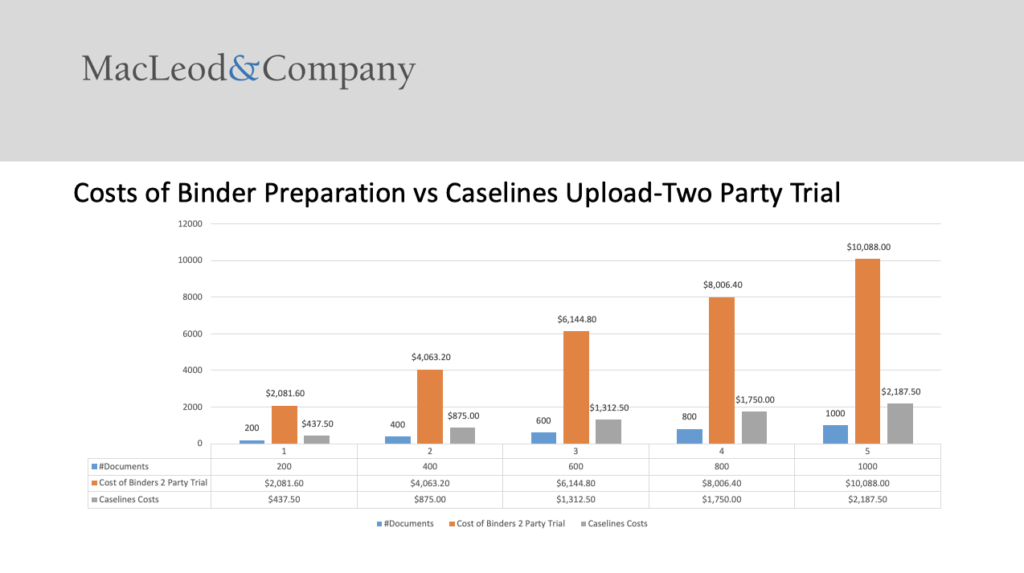Evidence on E-Trial costs is coming in, showing real savings to be had in a paperless courtroom. In November, William MacLeod Q.C. presented at the Pacific Legal Technology Conference, and shared his calculations that going paperless saves 10% of the time in the conduct of trial, and 80% of the time in preparation for trial.
Mr. MacLeod was counsel on the Hutchison E-Trial*. Trial ran for 29 days of evidence in Vancouver and 9 days of argument in Vancouver. It used the E-Trial Platform from the UK, Caselines.
Mr. MacLeod prepared a great paper summarizing Counsel’s experience with Caselines**. In it, he provides some compelling evidence for E-Trials. He calculates that E-Trials save money in two places. First, E-Trials save time when we are in court, because – when counsel is presenting or discussing evidence – all parties and the court arrive at the same page instantly. Mr. MacLeod compares this to how we usually litigate with paper, beginning with how long it takes for all parties to locate the exact page being discussed in court (a “transition”):
“If the saving of time with each transition is say 30 seconds, the total time accumulates. If this happens every five minutes this is 12 times per hour, and 48 times per court day. The loss of time on this analysis is 24 minutes per court day. In the available 4 hours of court time per day (240 minutes per day) this comes to a 10% saving of time per day.”
Second, Mr. MacLeod considers the time saved preparing for trial, back at the office. Preparation usually involves paralegals and other support staff physically producing document binders for court. In an E-Trial, all these documents are already loaded into the digital platform, and available in court. Thus, E-Trials all but eliminate this preparation time and expense.
MacLeod calculates this as an 80% saving, and notes the substantive benefit that “In the pressing time demands of trials, this enhances their effectiveness in assisting counsel”.
Why this matters: Here is an evidence-based reason to try an E-Trial: a 10% savings in court time is no insignificant advantage, and an 80% savings in preparation time is compelling. Counsel who are willing to go paperless in court may save their clients and themselves significant time and money. Further, saving time for the court may be one way for counsel to improve on the challenges of Access to Justice.
Also, MacLeod’s calculations emphasize that in the E-Trial environment, when claims involve more parties or run through more days, the costs do not scale up the way they do in the paper environment.

Source: William MacLeod Q.C., “Electronic Trials-Counsel’s Perspective after a Trial with CaseLines”, A Presentation for the Pacific Legal Technology Conference, November 15, 2019**
For example, Caselines, charges a one-time fee of $0.40/page to upload documents to the platform. After that, the number of counsel who access the documents, and the number of times the documents are accessed, does not increase the costs. This is in stark contrast to the paper environment, where more parties means more copies of application and authority binders are required, and both must be prepared fresh for every application along the way to trial.
* Hutchison v. Moore, 2019 BCSC 1479, appealed to the BCCA.
* * Mr. MacLeod’s excellent paper is available upon request.

